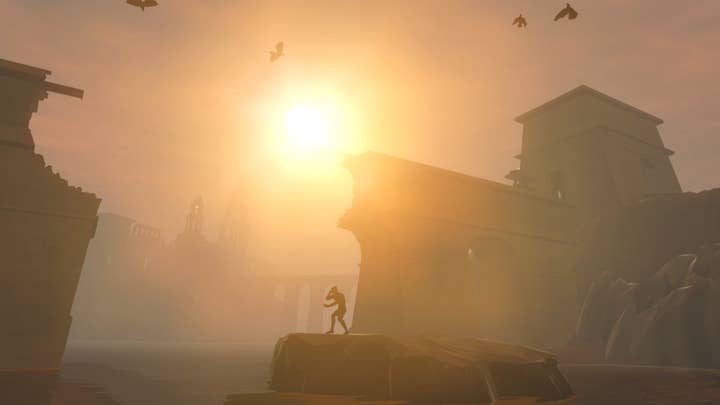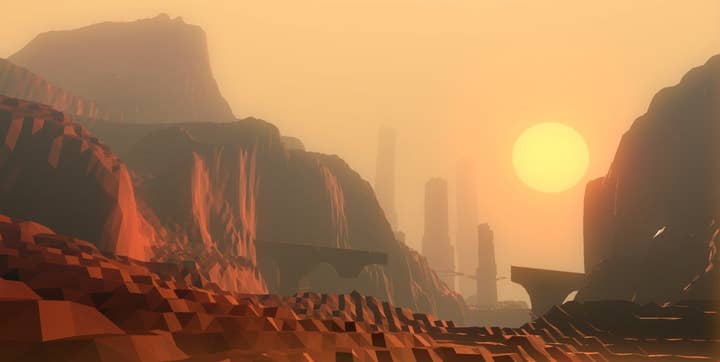'Antisocial VR' and the power of isolation
How Recluse Industries is embracing the power of minimalism to offer a refuge for the solitary gamer
Time and again we are told that the future of virtual reality is a social one.
Conventional wisdom often looks down upon the notion of a solitary user, buckled into a headset while enjoying offline, single-player content. More VR should be networked, second-screen friendly and multiplayer, so say the prevailing winds from technology's influencers. There's a sound, even optimistic logic to such a notion. Virtual reality is often at its best when shared, and to complement contemporary life it must jigsaw with a heavily connected world.
However, recognising the inherent limitations of VR has been essential in understanding how to best embrace the form. It's a lesson games developers and their contemporaries from the other industries gathering around the post-Oculus VR boom have taken from the new shared rulebook of delivering quality virtual reality content.
Fight against VR's struggle to offer freedom of locomotion as seen in traditional games, for example, and you may well make your audience feel queasy. Build content that seats the player, meanwhile, and many more people are likely to have a comfortable experience. Just as it was in the early days of games design for smartphones, so it is with virtual reality. Design with the hardware, not against it.
"Recognising the inherent limitations of VR has been essential in understanding how to best embrace the form"
So why this focus on the social, when most HMDs excel in isolating their players, cutting at least two senses from the world - and people - around them? There are many positive retorts to that question, of course. There is the potential of 'tele-presence', and the magic of one's first human-to-human meeting within VR games. Social virtual reality truly does bring with it tremendous opportunities for creativity, innovation and success.
But for one developer in particular, there is good reason to explore virtual reality content that focuses on - or even celebrates - the form's knack for physically isolating its players.
The most explicit clue as to how Martin Wheel perceives games is perhaps in the name of his studio, Recluse Industries, where he stands as Creative Director. The team - sometimes a handful of collaborators, but more often Wheeler alone - has been active for several years, releasing a number of mobile titles with a minimal bent, before moving on to the currently-in-development Separation, which is pitched as a meditative, atmospheric puzzle-adventure game, coming sometime this year to PlayStation VR.
And for Wheeler, it is a creation that demonstrates the value of isolation in HMD-based games. "Isolation in VR is so powerful, because you are existing within your head when you use it," Wheeler asserts. "That space you feel you are transported to is remarkable, and perhaps it is more impactful if you go there alone."
"There's a lot of pressure now, I feel, to make VR games multiplayer and more social"
It takes a certain confidence, though, to embrace that impact, as overenthusiastic marketers continually let out volleys of noise about how social is today's only VR trend worth attention.
"There's a lot of pressure now, I feel, to make VR games multiplayer and more social," muses Wheeler, who has been making games since his first release by Virgin, aged only 14, Dr. Franky & the Monsters. "Social VR content like that is great, of course, but I've always gone to games as my refuge.
"From coming back from school as a kid, I'd go to games as a place of escape. Back in the days of the ZX Spectrum I would play Knight Lore or something like Ant Attack. It would take me away, and give me that sanctuary from the world. And I still like to do that; go into a space where I don't feel I have to be sociable. I'm not saying all VR content should be like that, but in a way it's quite nice to be able go to an isolated space, and feel like you're the only person there."
To Wheeler, the video game as a place of refuge is still attractive to many consumers, and VR brings a new potential to experiences for the lone escapist.

"That's something increasingly hard to find in the modern world, especially as everything is so connected anyway," Wheeler offers. "Life can feel too social these days, even when you're on your own. So I think this might be something important. There might be a need for games that take you away from getting Facebook updates and having notifications pop up all over the place. That part of modern life can be offset by having a quiet place - a place to escape the social."
Wheeler is momentarily distracted my the idea that classic arcade games like Defender - one of his all time favourites - offer a similar form of isolation, but before his thought is complete, conversation turns to how one form of gaming should not dominate what virtual reality can be.
"Experiences that explore VR's power to isolate don't come at the expense of social VR, and Facebook are obviously very involved now," he ponders. "I'm sure there'll be many amazing social applications for VR, but isolation is so powerful. We shouldn't just look at the isolating potential of games as negative. They can offer something really important and positive; something that really helps people in their lives. Or just a nice place to be alone; really alone."
Separation, then, is something Wheeler playfully describes as a 'VR The Witness', but 'with only one puzzle spread across the entire gaming environment'. Deliberately understated, Separation certainly falls into 'ambient walking experience' territory, and somewhat ironically, it was inspired by the abundance of detail in Crytek's VR adventure, Robinson: The Journey.
"I think that emptiness - or rather minimalism - can work in VR to be very powerful, very isolating, and offer something quite different"
"Detail looks so amazing in VR," Wheeler states. "Well-rendered environments really draw you in and give you that presence. Looking at stuff up close, looking at small stuff, is really magical."
However, in Robinson, Wheeler clearly remembers how the gameplay mechanics distracted him from enjoying that detail. Meeting goals and pursuing objectives pulled him away from what he considers one of VR's most powerful abilities; simply moving your head.
"I like minimalism in general," says Wheeler, who also exists as a successful techno producer, going under the name Vector Lovers. "In my music I'm often attracted to minimalism. The music in Separation is very pared down. It reflects the sparse nature of the game, and I think that emptiness - or rather minimalism - can work in VR to be very powerful, very isolating, and offer something quite different from a traditional game experience."
"Minimalism of mechanics is important in VR too, especially if you're talking about games that are the opposite of social," he continues. "The real magic isn't doing all the things that have been part of games for years. The magic is just being able to look around. You're using the same interface - your neck - as you do in real life. That feels great, so I wanted the player to be looking around, or free to look around, rather than focusing on specific puzzles all the time."

In short, Separation gives its players a chance to be alone, and be with their thoughts. There is gameplay, absolutely, but it offers the user a chance to go at their own pace, be in their own place, and digest a world alone, without external distractions like social media, and internal ones like luscious detail.
It's a train of thought that takes Wheeler back to pondering Defender.
"Playing games like Defender and Asteroids, by today's standards things are really paired down. The gameplay itself is minimal, and it lets you really notice what's going on."
The likes of Defender are far from meditative or understated, but there is a powerful mechanical minimalism. And as a result, Wheeler believes, such titles offer isolation through demanding absolute concentration.
"There's a real beauty to that kind of minimal game design, and I think there's a real opportunity in VR to explore those concepts and experiences of playing alone in a totally different way."
"Barren and empty places are very powerful for this kind of isolation. I don't want to overwhelm the player with things to do"
Of course, the link between isolating VR games and minimal mechanics is, for Recluse Industries, a practical consideration too. "Working alone, I was never going to have a huge, detailed world," Wheeler admits. "You have to work with what you're capable of in VR. But that can really guide your game design. Separation naturally had to be an austere, sparse landscape, just in terms of me alone being able to fill such a large world."
"So I just made something quite empty," he says with a smile that nods to such an oversimplification. "Seriously, though, barren and empty places are very powerful for this kind of isolation. I don't want to overwhelm the player with things to do. And working alone tends to make that a necessity."
As it happens, Separation isn't the game Wheeler set out to make.
"When I started out, I was working on something much more 'gamey'," the developer reveals. "Or, at least, I thought I was. It turned out to feel much more like an album. I mean, it's an experience, strictly speaking, and it's a game. But as I experimented, adding more game-like elements and taking them out, I ended up with something I feel people will consume in a slightly different way."
The album allegory has been made by developers before, but here Wheeler isn't comparing levels to tracks or espousing the merits of short-form experiences. Rather, he hopes people will dip into Separation as they would with an album; perhaps to take their mind off life on getting home from work.
"Separation is a place to be, and an experience to have alone, rather than somewhere that compels you or pushes you to tackle objectives or pursue goals," Wheeler concludes.
Equally, it would seem, it is a place to offer the same kind of refuge the aspiring developer got from his ZX Spectrum on returning home from school.
And for other developers, it may serve as an inspiration that not every VR experience has to be made to connect people.
